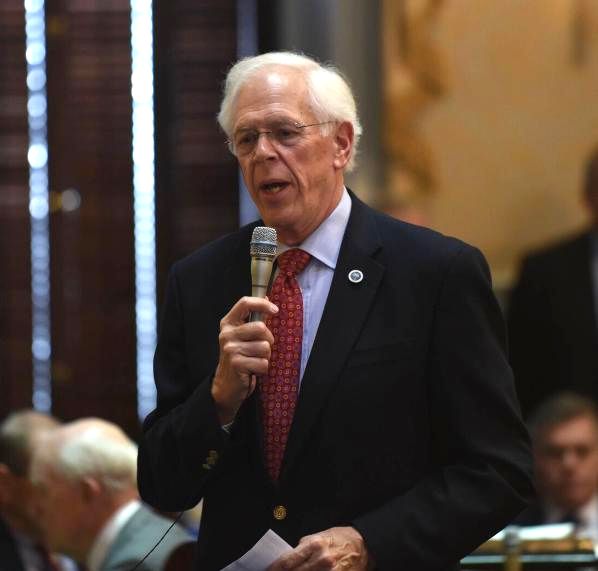Dear Friends:
3 days! There are just three days left in the first year of this regular legislative session. That always results in the annual scramble to finish with the passage of crucial legislation to avoid having bills held over until the regular session resumes next January.
Next Thursday won’t be our last day. We will likely return to the Statehouse for many days during May to complete work on next year’s state budget, which takes effect July 1st and resolve differences in legislation that both the House and Senate have passed. Those conference committees will be busy. But like the past three years during the pandemic, that finish line will be extended.
But first — the BIG NEWS. Pro-life/abortion legislation is back center stage and in the spotlight.
Pro-Life/Abortion Bill Resurrected
 With the state Senate’s recent rejection of legislation that would have brought SC a near-total abortion ban with limited exceptions, another attempt has been initiated to pass pro-life legislation.
With the state Senate’s recent rejection of legislation that would have brought SC a near-total abortion ban with limited exceptions, another attempt has been initiated to pass pro-life legislation.
This week, there was much shuttle diplomacy between the House and Senate leadership to seek a path forward. That resulted in scheduling a Tuesday morning hearing of a House panel to consider the Senate’s revised version of the ‘Fetal Heartbeat bill 2.0’, which they passed early in this session. That legislation generally limits abortions after six weeks, with necessary exceptions.
Procedurally, it is doubtful the House will be able to debate the issue next week. That will necessitate Governor McMaster calling us back into session the following week to consider ‘Heartbeat 2.0.’
Further urgency was provided Thursday when North Carolina legislators approved a ban on nearly all abortions after 12 weeks of pregnancy, down from their current 20 weeks. NC’s Democrat Governor has pledged a veto; Republican lawmakers say they have the votes to override his veto. This would leave SC as the only abortion destination state in the Southeast. SC has defaulted to an older law that bans abortions after 22 weeks because our State Supreme Court struck down the original Heartbeat bill. Stay tuned for developments.
TOP LEGISLATIVE NEWS
This week we achieved significant victories for healthcare and education in SC. We also took the first step to block the implementation in SC of the feds’ funny-money,’ otherwise known as digital currency.
Stopping Federal Digital Currency
 Thursday, I filed legislation to ban the use of central bank digital currency as money in SC. Forty of my fellow Republican Representatives joined me in sponsoring the bill (H.4442). This legislation will protect SC consumers and businesses from the reckless and dangerous adoption of the ‘centralized digital dollar,’ which has the potential of government-sanctioned surveillance.
Thursday, I filed legislation to ban the use of central bank digital currency as money in SC. Forty of my fellow Republican Representatives joined me in sponsoring the bill (H.4442). This legislation will protect SC consumers and businesses from the reckless and dangerous adoption of the ‘centralized digital dollar,’ which has the potential of government-sanctioned surveillance.
The bill explicitly excludes CBDC from the definition of money in SC, effectively banning its use in the state and protecting South Carolinians and businesses from the reckless adoption of a ‘centralized digital dollar’ that threatens personal economic freedom and security. Rep. Kathy Landing has filed similar legislation. I have also joined as a cosponsored of her bill.
ESG Pushback Gets Senate Green Light
The Senate’s Finance Committee voted unanimously this week to send my “ESG Pension Protection Act” (H.3690) to the full Senate. It is on the their calendar for a vote this final week of the session. The house has already  approved the bill that requires the state’s retirement system to consider only “pecuniary factors” when making investment decisions. Simply said, they are to maximize monetary returns for the 650,000 retirees in the state system. That essentially bars the retirement system from using environmental, social and governance (ESG) factors.
approved the bill that requires the state’s retirement system to consider only “pecuniary factors” when making investment decisions. Simply said, they are to maximize monetary returns for the 650,000 retirees in the state system. That essentially bars the retirement system from using environmental, social and governance (ESG) factors.
I filed this bill because we cannot sit back and risk that the mega-investment firms will use the power of our pension funds to coerce corporate executives to invest in social objectives at the expense of hard-working South Carolinians.
We Repealed CON! – Lowering Costs & Providing Greater Access to Healthcare
 Legislation to overhaul the healthcare industry in SC has been two decades in the making. This week, the House passed legislation eliminating the state’s Certificate of Need (CON), a concept pushed by the federal government 50 years ago. The Senate quickly agreed with House amendments to S.164 and sent the bill to Gov. McMaster for his approval.
Legislation to overhaul the healthcare industry in SC has been two decades in the making. This week, the House passed legislation eliminating the state’s Certificate of Need (CON), a concept pushed by the federal government 50 years ago. The Senate quickly agreed with House amendments to S.164 and sent the bill to Gov. McMaster for his approval.
CON asserted government control over healthcare to promote lower costs and prevent unnecessary duplication of healthcare facilities and services. CON didn’t work and caused more harm than good.
This legislation immediately eliminates the CON requirement for most healthcare facilities but places a three-year sunset for hospitals in most counties giving those hospitals time to prepare for competition. Border counties such as Aiken (adjacent to Augusta) and York County (just south of Charlotte) will likely see competitors arriving from neighboring states.
“This will mean more maternity and neonatal care for moms and babies, more beds for mental health care, more MRI machines, and new hospitals in rural counties,” Americans for Prosperity-South Carolina AFP-SC State Director Candace Carroll said in a statement after the House passed the measure.
Large healthcare systems servicing SC did not support an effort to remove the Certificate of Need. However, the SC Hospital Association stated it has long supported reforming CON and was grateful that the repeal temporarily preserves the process for hospitals and provides a period to monitor the impact of this significant legislation on healthcare access in South Carolina.
Improving Access to Telehealth and Telemedicine
The House unanimously passed the South Carolina Telehealth and Telemedicine Modernization Act (H.4159). This bill will improve access to healthcare services for all South Carolinians, especially those in remote or underserved areas. Telemedicine is a critical tool in today’s digital age, increasing access to quality medical care. With the implementation of Telehealth services, patients can receive quality medical care without visiting a doctor’s office in person.
School Choice Becomes Law in SC
 Surrounded by students who will be the beneficiaries, Gov. Henry McMaster signed legislation creating SC’s first broad private K-12 school choice program. It will provide parents with $6,000 annually to aid with their educational choices for their kids. The enactment of the Education Savings Accounts (ESAs) is transformational and culminates two decades of work by Republican legislators and Governors.
Surrounded by students who will be the beneficiaries, Gov. Henry McMaster signed legislation creating SC’s first broad private K-12 school choice program. It will provide parents with $6,000 annually to aid with their educational choices for their kids. The enactment of the Education Savings Accounts (ESAs) is transformational and culminates two decades of work by Republican legislators and Governors.
In signing the bill into law, Gov. McMaster said, “This rocket has launched, and it’s going to produce great results.”
The law (S.39) starts small and will serve as a pilot program. It initially limits participation to 5,000 K-12 students eligible for Medicaid. By the third year, participation caps at 15,000 students with a household income of up to 400 percent of federal poverty guidelines. A court challenge is expected to delay the rollout of the choice program.
Helping Kids to Read
It’s said that third-grade students are learning to read; after third grade, they read to learn. Too many students are not reading on grade level at the end of third grade, which provides them with enormous challenges going forward. This week, the House amended S.418 and sent it back to the Senate. The legislation requires the State Education Department to enforce the ‘Read To Succeed’ legislation the General Assembly passed when Nikki Haley was governor and toughens up the enforcement of the original legislation.
Supporting Our Educators
Being a supporter of school choice, I am also a strong supporter of our public teachers. I was proud to vote this week for the Educator Assistance Act (H.4280), which establishes a permanent teaching certificate in SC, eliminating the paperwork required every five years for recertification. Educators play a crucial role in shaping the minds and values of the next generation, and they deserve to be valued and supported for their work.
Water Safety
Following an increase in boating accidents and fatalities in SC, legislation to beef up boater safety should soon be sent to the governor for approval. Tuesday, the House passed a bill that requires anyone under the age of 16 to receive boater education training before operating any watercraft in the state. The requirement would also apply to anyone under 16 renting a boat or jet ski. If the Senate signs off on the House amendments, the bill would only await Gov. Henry McMaster’s signature before becoming law. There were 22 recreational boating fatalities in the state in 2022, up from 15 deaths in 2018.
LEGISLATIVE BRIEFS
Paid Family Leave Approved
Teachers and other full-time school district employees may soon be able to take paid time off after the birth of a child. The Senate approved a House bill (H.3908) providing six weeks of paid parental leave policy for school district employees if they give birth or adopt a child. If the employee is a co-parent, such as the father, who did not give birth, they will receive two weeks of paid leave. This is the same leave available to state employees. This allows new parents to take time off to care for their children without sacrificing their income or job security and is critical in retaining experienced teachers and attracting new teachers.
Lethal Injections
Executions may soon resume in SC after a 12-year hiatus. This week, the Senate sent a bill (S.120) to the governor’s desk that would expand the state’s so-called “shield law” by granting secrecy to the suppliers of the lethal drugs used in executions. This bill would allow the procedure to restart for the first time since 2011. In SC, 33 men sit on death row. Gov. McMaster has pledged to sign the bill.
Protecting Police & Judges
With today’s increasing lawlessness, we must protect the safety of our law enforcement officers and judges from criminal retribution. The House unanimously passed the Law Enforcement Personal Information Privacy Protection Act (S.252). This legislation allows for personal identifying information held by a state or local government agency not to be disclosed. The Senate previously passed the bill unanimously.
Banning Squat Trucks
 Legislation banning ‘Carolina Squat Trucks’ is one step closer to becoming law. Squats are a dangerous vehicle modification that raises the front end of a vehicle high enough that it impedes a driver’s ability to see over the hood. On Thursday, the Senate concurred with House amendments and passed S.363, sending it to the governor for his signature.
Legislation banning ‘Carolina Squat Trucks’ is one step closer to becoming law. Squats are a dangerous vehicle modification that raises the front end of a vehicle high enough that it impedes a driver’s ability to see over the hood. On Thursday, the Senate concurred with House amendments and passed S.363, sending it to the governor for his signature.
Cracking Down on DUI Offenders
The House approved legislation (S.36) to expand the scope of using interlock ignition devices in motor vehicles for habitual offenders seeking reinstatement of their driver’s licenses. It was amended so anyone issued a temporary alcohol license would have to install these devices in the motor vehicle they will drive using that license.
Banning Prison Cell Phones
Cell phones in prisons are dangerous and can be deadly. The House approved legislation (H.4002) that no inmate could possess a cell phone, two-way pagers, handheld radios, personal digital assistants, or laptop computers while incarcerated. Violators of these contraband devices could face penalties ranging from one to five years in jail, depending on the number of the offense. If they are found to have been used in the commission of a subsequent felony, violators will face up to an additional ten years in jail.
Shooting Transformers
After national incidents of damage to electric transformers, the House approved legislation (S.330) that would put a graduated-tier system of punishments that enhances those set out in our existing criminal code. The bill was sent back to the Senate for their approval.
Removing Barriers for Retired Law Enforcement Officers
The Police Officers Retirement System Earnings Limitation Bill (H.3425) removes earning limitations currently placed on retired law enforcement who wish to return to work. With a shortage of law enforcement officers, we should encourage those who have retired and want to return to service to do so, not penalize them by placing limitations on their earnings. This bill passed out of the House Ways and Means Committee and will now head to the floor.
Breaking Up is Hard to Do
For the second straight year, the Senate has voted to break up the state’s Department of Health and Environmental Control (DHEC). Their bill, passed unanimously, would dissolve DHEC and create two separate agencies under the governor’s control. The new environmental agency would be named the Department of Environmental Services, which would have divisions to monitor air quality, land and waste management, water usage, regional and laboratory services, and coastal management, according to the plan. Some of DHEC’S environmental responsibilities would shift to the Department of Agriculture. South Carolina is one of three states that combine environmental regulation and health care under one roof. The legislation has been sent to the House, where it will likely be addressed next year.
No to Locals — Tobacco Preemption Bill
Currently, cities and counties in SC are free to enact their own restrictions on tobacco and vape sales. But a House bill (H.3681), approved by the Senate this week, would ban them from imposing these local rules. The bill makes it illegal for local governments to enforce local rules on cigarettes, e-cigarettes, vape, and other tobacco and nicotine product sales, including banning products with certain flavors or ingredients from being sold within a city or county. Uniform tobacco regulations are needed statewide for businesses that operate in multiple places. The Senate amended the bill to crack down on stores illegally selling nicotine products to minors. It will require House approval before sending it to the governor.
Air B&B Regulations
A House panel has derailed controversial legislation limiting local government’s ability to restrict short-term rentals. Opponents claimed the bill usurps cities’ self-governing rights. Opponents said a one-size-fits-all approach doesn’t work because each city and town have different housing circumstances.
What’s in a Name? Money!
Aiken and Edgefield Counties have been missing out on federal funds to help veterans living in those counties because Ft. Gordon in Augusta is not listed in SC’s State laws. Rep. Bill Hixon (R-North Augusta) seeks to remedy that with H.3934, which names Ft. Gordon in specific lists. Twenty percent of Ft. Gordon’s workforce resides in Aiken and Edgefield Counties. The bill was approved and sent to the Senate.
USC-Aiken Graduation
It was a grand graduation for more than 400 USC-Aiken students Thursday evening. Lots of family cheering greeted the graduates. Members of the Aiken Legislative Delegation were hosted by USCA Chancellor Dan Heimmermann and USC President Michael Amiridis.

PICTURE OF THE WEEK
 Rep. Bill Hixon and I joined many legislators at the Statehouse this week in signing an American flag that will be carried across SC in the days proceeding Veterans Day, November 11th. The flag will be carried by a contingent of an elite team of Special Operators in the ‘Enough is Enough March for Veterans.’ The goal is to spread awareness and raise $50,000 for organizations that combat veteran mental health issues. The 160+ mile march will follow Hwy.1 from the NC border to just across the SC border in Aiken County. Aiken Veteran leader Lowell Koppert is leading the initiative sponsored by 56 Brave Patriotic Apparel.
Rep. Bill Hixon and I joined many legislators at the Statehouse this week in signing an American flag that will be carried across SC in the days proceeding Veterans Day, November 11th. The flag will be carried by a contingent of an elite team of Special Operators in the ‘Enough is Enough March for Veterans.’ The goal is to spread awareness and raise $50,000 for organizations that combat veteran mental health issues. The 160+ mile march will follow Hwy.1 from the NC border to just across the SC border in Aiken County. Aiken Veteran leader Lowell Koppert is leading the initiative sponsored by 56 Brave Patriotic Apparel.
Want to Know More?
Do you want to learn more about my positions, bill sponsorships, voting record, and past writings? Here are some handy links:
- About Me: https://taylorschouse.com/about-2/
- My Positions: https://taylorschouse.com/issues/
- Sponsored Bill & Voting Record: http://tiny.cc/b1pouz
- Recent Newsletters: https://taylorschouse.com/category/newsletter/
I’m Available & AT YOUR SERVICE

It is my honor to be of service. Please do not hesitate to contact me if you need assistance navigating state government or have any thoughts or concerns about the legislature.
In Your Service,

Email: Bill@taylorschouse.com
www.TaylorSCHouse.com
Newsletter not paid using taxpayer funds.
Legal Notice: This newsletter is not a solicitation for contributions to any SC registered lobbyist.

